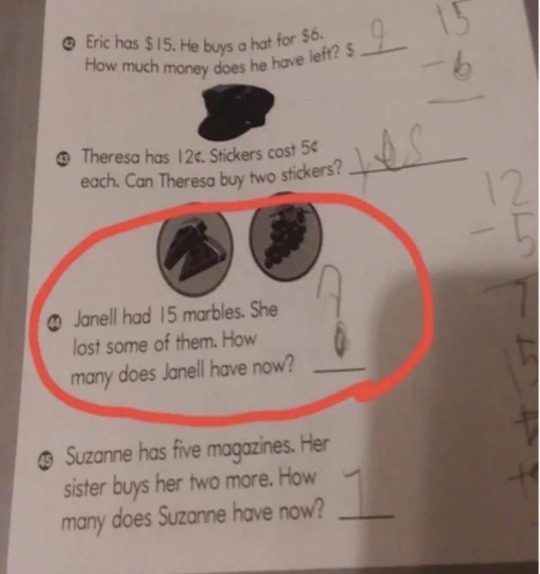#common core
Text
American education has all the downsides of standardization, none of the upsides
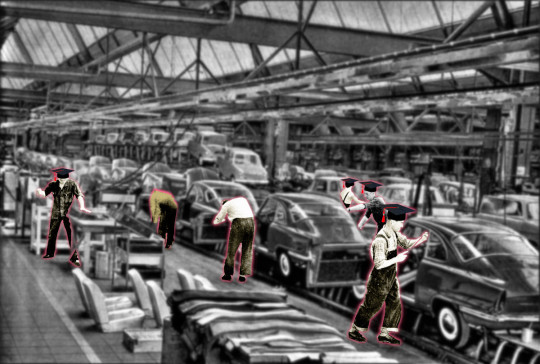
Catch me in Miami! I'll be at Books and Books in Coral Gables on Jan 22 at 8PM.

We moved to America in 2015, in time for my kid to start third grade. Now she's a year away from graduating high school (!) and I've had a front-row seat for the US K-12 system in a district rated as one of the best in the country. There were ups and downs, but high school has been a monster.
We're a decade and a half into the "common core" experiment in educational standardization. The majority of the country has now signed up to a standardized and rigid curriculum that treats overworked teachers as untrustworthy slackers who need to be disciplined by measuring their output through standard lessons and evaluations:
https://en.wikipedia.org/wiki/Common_Core
This system is rigid enough, but it gets even worse at the secondary level, especially when combined with the Advanced Placement (AP) courses, which adds another layer of inflexible benchmarks to the highest-stakes, most anxiety-provoking classes in the system:
https://en.wikipedia.org/wiki/Advanced_Placement
It is a system singularly lacking in grace. Ironically, this unforgiving system was sold as a way of correcting the injustice at the heart of the US public education system, which funds schools based on local taxation. That means that rich neighborhoods have better funded schools. Rather than equalizing public educational funding, the standardizers promised to ensure the quality of instruction at the worst-funded schools by measuring the educational outcomes with standard tools.
But the joke's on the middle-class families who backed standardized instruction over standardized funding. Their own kids need slack as much as anyone's, and a system that promises to put the nation's kids through the same benchmarks on the same timetable is bad for everyone:
https://pluralistic.net/2021/11/28/give-me-slack-2/
Undoing this is above my pay-grade. I've already got more causes to crusade on than I have time for. But there is a piece of tantalyzingly low-hanging fruit that is dangling right there, and even though I'm not gonna pick it, I can't get it out of my head, so I figured I'd write about it and hope I can lazyweb it into existence.
The thing is, there's a reason that standardization takes hold in so many domains. Agreeing on a common standard enables collaboration by many entities without any need for explicit agreements or coordination. The existence of the ANSI/SAE J563 standard automobile auxiliary power outlet (AKA "car cigarette lighter") didn't just allow many manufacturers to make replacement lighter plugs. The existence of a standardized receptacle delivering standardized voltage to standardized contacts let all kinds of gadgets be designed to fit in that socket.
Standards crystallize the space of all possible ways of solving a problem into a range of solutions. This inevitably has a downside, because the standardized range might not be optimal for all applications. Think of the EU's requirement for USB-C charger tips on all devices. There's a lot of reasons that manufacturers prefer different charger tips for different gadgets. Some of those reasons are bad (gouging you on replacement chargers), but some are good (unique form-factor, specific smart-charging needs). USB-C is a very flexible standard (indeed, it's so flexible that some people complain that it's not a standard at all!) but there are some applications where the optimal solution is outside its parameters.
And still, I think that the standardization on USB-C is a force for good. I have drawers full of gadgets that need proprietary charger tips, and other drawers full of chargers with proprietary tips, and damned if I can make half of them match up. We've continued our pandemic lockdown tradition of my wife cutting my hair in the back yard, and just tracking the three different charger tips for the three clippers she uses is an ongoing source of frustration. I'd happily trade slightly sub-optimal charging for just being able to plug any of those clippers into the same cable I charge my headphones, phone, tablet and laptop on.
The standardization of American education has produced all the downsides of standardization – a rigid, often suboptimal, one-size-fits-all system – without the benefits. With teachers across America teaching in lockstep, often from the same set texts (especially in the AP courses), there's a massive opportunity for a commons to go with the common core.
For example, the AP English and History classes my kid takes use standard texts that are often centuries old and hard to puzzle out. I watched my kid struggle with texts for learning about "persuasive rhetoric" like 17th century pamphlets that inspired anti-indigenous pogroms with fictional accounts of "Indian atrocities."
It's good for American schoolkids to learn about the use of these blood libels to excuse genocide, but these pamphlets are a slog. Even with glossaries in the textbooks, it's a slow, word-by-word matter to parse these out. I can't imagine anyone learning a single thing about how speech persuades people just by reading that text.
But there's nothing in the standardized curriculum that prevents teachers from adding more texts to the unit. We live in an unfortunate golden age for persuasive texts that inspire terrible deeds – for example, kids could also read core Pizzagate texts and connect the guy who shot up the pizza parlor to the racists who formed a 17th century lynchmob.
But teachers are incredibly time-constrained. For one thing, at least a third of the AP classroom time seems to be taken up with detailed instructions for writing stilted, stylized "essays" for the AP tests (these are terrible writing, but they're easy to grade in a standardized way).
That's where standardization could actually deliver some benefits. If just one teacher could produce some supplemental materials and accompanying curriculum, the existence of standards means that every other teacher could use it. What's more, any adaptations that teachers make to that unit to make them suited to their kids would also work for the other teachers in the USA. And because the instruction is so rigidly standardized, all of these materials could be keyed to metadata that precisely identified the units they belonged to.
The closest thing we have to this are "marketplaces" where teachers can sell each other their supplementary materials. As far as I can tell, the only people making real money from these marketplaces are the grifters who built them and convinced teachers to paywall the instructional materials that could otherwise form a commons.
Like I said, I've got a completely overfull plate, but if I found myself at loose ends, trying to find a project to devote the rest of my life to, I'd be pitching funders on building a national, open access portal to build an educational commons.
It may be a lot to expect teachers to master the intricacies of peer-based co-production tools like Git, but there's already a system like this that K-8 teachers across the country have mastered: Scratch. Scratch is a graphic programming environment for kids, and starting with 2019's Scratch 3.0, the primary way to access it is via an in-browser version that's hosted at scratch.mit.edu.
Scratch's online version is basically a kid- (and teacher-)friendly version of Github. Find a project you like, make a copy in your own workspace, and then mod it to suit your own needs. The system keeps track of the lineage of different projects and makes it easy for Scratch users to find, adapt, and share their own projects. The wild popularity of this system tells us that this model for a managed digital commons for an educational audience is eminently achievable.
So when students are being asked to study the rhythm of text by counting the numbers of words in the sentences of important speeches, they could supplement that very boring exercise by listening to and analyzing contemporary election speeches, or rap lyrics, or viral influencer videos. Different teachers could fork these units to swap in locally appropriate comparitors – and so could students!
Students could be given extra credit for identifying additional materials that slot into existing curricular projects – Tiktok videos, new chart-topping songs, passages from hot YA novels. These, too, could go into the commons.
This would enlist students in developing and thinking critically about their curriculum, whereas today, these activities are often off-limits to students. For example, my kid's math teachers don't hand back their quizzes after they're graded. The teachers only have one set of quizzes per unit, and letting the kids hold onto them would leak an answer-key for the next batch of test-takers.
I can't imagine learning math this way. "You got three questions wrong but I won't let you see them" is no way to help a student focus on the right areas to improve their understanding.
But there's no reason that math teachers in a commons built around the (unfortunately) rigid procession of concepts and testing couldn't generate procedural quizzes, specified with a simple programming language. These tests could even be automatically graded, and produce classroom stats on which concepts the whole class is struggling with. Each quiz would be different, but cover the same ground.
When I help my kid with her homework, we often find disorganized and scattered elements of this system – a teacher might post extensive notes on teaching a specific unit. A publisher might produce a classroom guide that connects a book to specific parts of the common core. But these are scattered across the web, and they aren't keyed to the specific, standard components of common core and AP.
This is a standardized system that is all costs, no benefits. It has no "architecture of participation" that lets teachers, students, parents, practitioners and even commercial publishers collaborate to produce a commons that all may share and improve upon.
In an ideal world, we'd get rid of standardization in education, pay teachers well, give them the additional time they needed to prepare exciting and relevant curriculum, and fund all our schools based on need, not parents' income.
But in the meanwhile, we could be making lemonade of out lemons. If we're going to have standardization, we should at least have the collaboration standards enable.
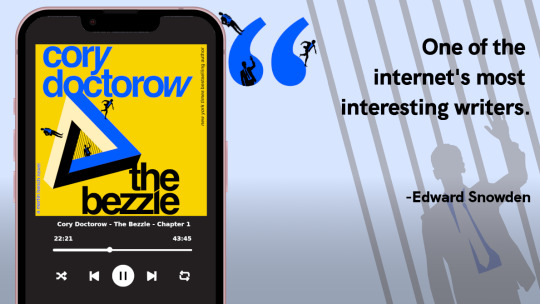
I'm Kickstarting the audiobook for The Bezzle, the sequel to Red Team Blues, narrated by @wilwheaton! You can pre-order the audiobook and ebook, DRM free, as well as the hardcover, signed or unsigned. There's also bundles with Red Team Blues in ebook, audio or paperback.

If you'd like an essay-formatted version of this post to read or share, here's a link to it on pluralistic.net, my surveillance-free, ad-free, tracker-free blog:
https://pluralistic.net/2024/01/16/flexibility-in-the-margins/#a-commons
499 notes
·
View notes
Text
3 notes
·
View notes
Text
it’s been a bad week for hunger games fans. if i have to read one more “theory” i will licherally delete tiktok. i was 12 when i read the entire series for the first time. it was right before the first movie came out. this IS a literacy issue. u know what class i had been taking my whole life, and was officially expelled from the curriculum the year after the hunger games movie came out? (at least the curriculum in my state) reading. we used to have reading classes, where they taught us how to read, how to think critically, how to utilize context clues. common core pushed reading out and combined it all into english class, which used to be language arts which was focused on writing, not reading. full stop i don’t think some of these people who are “theorizing” have ever heard the word dystopian before, they don’t understand the difference between subtext and context, they don’t understand that implied text is still text and that a writer who leaves holes to be filled by implied text is not a writer leaving a plot hole. it’s like please i beg of you start listening to your english teachers. this is why trends like “it’s just a blue curtain” are harmful. metaphors do exist and figures of speech are around us at all times. please read deeper and be more thoughtful
#hunger games#tiktok#english#literature#reading#language arts#common core#reading comprehension#context clues#katniss and peeta#gale#primrose
8 notes
·
View notes
Text
Common Core Math was pretty cool and in theory a good way to teach children math fundamentals in a more concrete way. People just didn’t like it because the parents couldn’t do their kids homework for them since they never learned it.
#fun fact: I hated arithmetic and whatnot and actually taught myself something similar to common core to get by in class#common core#unded rambles
7 notes
·
View notes
Text
@math

A Helpful Guide to Common Core Math
#math books#books & libraries#common core#staar test#ged test#math textbooks#math worksheet#workbook
2 notes
·
View notes
Text
The Importance of Handwriting is Becoming Better Understood! Research on Pens and Paper Highlights Their Benefits
— September 14th, 2023

A Person's Hand, Writing with a Pen that has a Lightbulb on the End. Image: Nick Lowndes
Two and a Half Millennia Ago, Socrates complained that writing would harm students. With a way to store ideas permanently and externally, they would no longer need to memorise. It is tempting to dismiss him as an old man complaining about change. Socrates did not have a stack of peer-reviewed science to make his case about the usefulness of learning concepts by heart.
Today a different debate is raging about the dangers of another technology—computers—and the typing people do on them. As primary-school pupils and Ph.D hopefuls return for a new school year in the northern hemisphere, many will do so with a greater-than-ever reliance on computers to take notes and write papers. Some parents of younger students are dismayed that their children are not just encouraged but required to tote laptops to class. University professors complain of rampant distraction in classrooms, with students reading and messaging instead of listening to lectures.
A line of research shows the benefits of an “innovation” that predates computers: handwriting. Studies have found that writing on paper can improve everything from recalling a random series of words to imparting a better conceptual grasp of complicated ideas.
For learning material by rote, from the shapes of letters to the quirks of English spelling, the benefits of using a pen or pencil lie in how the motor and sensory memory of putting words on paper reinforces that material. The arrangement of squiggles on a page feeds into visual memory: people might remember a word they wrote down in French class as being at the bottom-left on a page, par exemple.
One of the best-demonstrated advantages of writing by hand seems to be in superior note-taking. In a study from 2014 by Pam Mueller and Danny Oppenheimer, students typing wrote down almost twice as many words and more passages verbatim from lectures, suggesting they were not understanding so much as rapidly copying the material.
Handwriting—which takes longer for nearly all university-level students—forces note-takers to synthesise ideas into their own words. This aids conceptual understanding at the moment of writing. But those taking notes by hand also perform better on tests when students are later able to study from their notes. The effect even persisted when the students who typed were explicitly instructed to rephrase the material in their own words. The instruction was “completely ineffective” at reducing verbatim note-taking, the researchers note: they did not understand the material so much as parrot it.
Many studies have confirmed handwriting’s benefits, and policymakers have taken note. Though America’s “Common Core” curriculum from 2010 does not require handwriting instruction past first grade (roughly age six), about half the states since then have mandated more teaching of it, thanks to campaigning by researchers and handwriting supporters. In Sweden there is a push for more handwriting and printed books and fewer devices. England’s national curriculum already prescribes teaching the rudiments of cursive by age seven.
However, several school systems in America have gone so far as to ban most laptops. This is too extreme. Some students have disabilities that make handwriting especially hard. Nearly all will eventually need typing skills. And typing can improve the quality of writing: being able to get ideas down quickly, before they are forgotten, can obviously be beneficial. So can slowing down the speed of typing, says Dr. Oppenheimer.
Virginia Berninger, Emeritus Professor of Psychology at the University of Washington, is a longtime advocate of handwriting. But she is not a purist; she says there are research-tested benefits for “manuscript” print-style writing, for cursive (which allows greater speed) but also for typing (which is good practice for composing passages). Since students spend more time on devices as they age, she argues for occasional “tuning up” of handwriting in later school years.
And perhaps even into adulthood. Johnson had not handwritten anything longer than a letter in decades before putting actual pen to paper to write this column’s first draft. Whether it made any difference to the outcome is a question that readers must decide.
Socrates may or may not have had a point about the downsides of writing. But no one would remember, much less care, if his student Plato had not noted it down for the benefit of posterity.■
— This Article Appeared in the Culture Section of the Print Edition Under the Headline "Hand-wringing Over Handwriting"
#Culture | Johnson#Importance | Handwriting#Better Understood#Research 🔬 | Pens 🖊️ | Paper 📑#Highlights | Benefits#Socrates#Hand-wringing Over Handwriting#The Economist#Pam Mueller | Danny Oppenheimer#Common Core#Virginia Berninger | Emeritus Professor of Psychology | University of Washington
0 notes
Photo
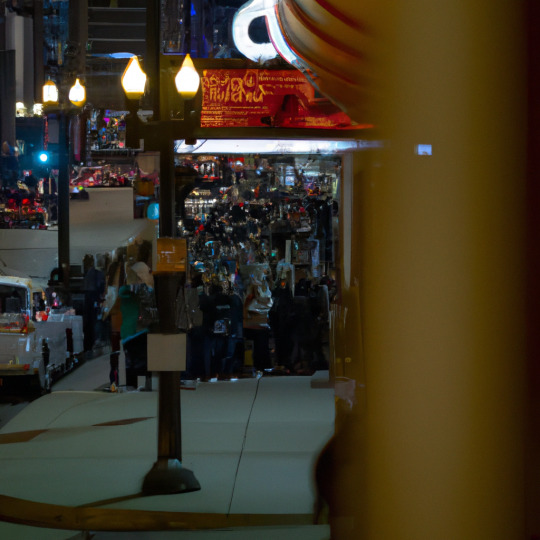
The Margin: GOP debate highlights: Vivek Ramaswamy 'sounds like ChatGPT,' Chris Christie gets stuck with 'the UFO question' and more. The mood was electric at the GOP debate last night, as the candidates sparred and traded barbs. Highlights included Vivek Ramaswamy's comments on ChatGPT, and Chris Christie's unfortunate run-in with 'the UFO question.' Ramaswamy's cutting insight was that ChatGPT "sounds like a really bad idea," while Christie was asked about his thoughts on UFOs. In a stunning display of candor, Christie admitted that he doesn't know what UFOs are, but he's "going to look into it." The other candidates also had their moments, with Jeb Bush delivering a stirring defense of Common Core and Marco Rubio scoring points with his tough stance on immigration. But in the end, it was Ramaswamy and Christie who stole the show.
0 notes
Text
Writing Instruction in the World of Artificial Intelligence: (An Excerpt)
The following is another excerpt from my work in progress on using AI in the classroom. This part focuses on the history of invention and education.
The Influence of the Movable-Type Press
Prior to the invention of the movable-type press in medieval Europe, the written word was far less accessible. Each copy of a work had to be handwritten and was thusly undertaken by specially trained…
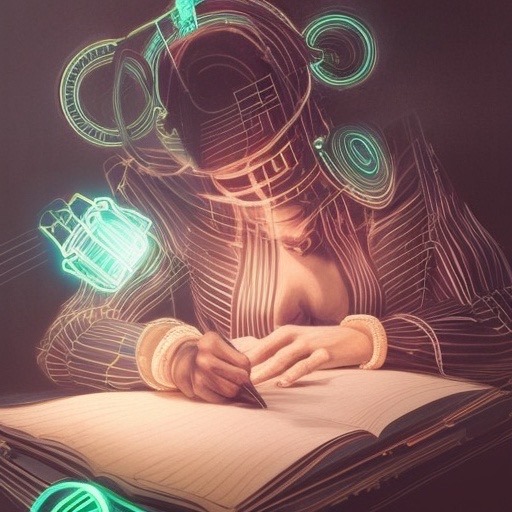
View On WordPress
#ai#artificial intelligence#chatgpt#chatgpt in education#common core#education#english#history#mungall#writing
1 note
·
View note
Text
Me: Wait, did you do Common Core math?
Him(bo): No, but I wish I did! I learned the whole swoop-dee-do here's some long division, memorize you times tables bullshit, and then later YouTube came out and I watch these videos and they're like 'see? We put these numbers in this bucket and those over there's and I'm like, 'WHAT THE FUCK THIS MAKES SO MUCH SENSE!'
Me: hold up, don't say anything for a minute *furiously typing*
#my himbo boyfriend#himbo#himbo quotes#stoner thoughts#common core#math#public school#different learning styles is that still a thing?#im pretty sure its not
1 note
·
View note
Text
The Shining Light grows Dim
Is this the final chapter of
America's history?
America: Too Meek to Win, Too Weak to Survive
Without pebbles, the stream would have no voice. Without evil, there would be no way to know good. Balance is the difference between chaos and peace. America is out of balance.
Many Christians believe the meek shall inherit the Earth. But those who are seeing the reality of today understand that without divine intervention that inheritance may be…
View On WordPress
0 notes
Text
Common Core Math is Not the Problem
Common Core Math is Not the Problem

View On WordPress
#common core#common core math#crash landing#crashdlanding#education#elementary education#family#just say no to charter schools#kentucky#non-fiction#schools#standards#state run education#what
0 notes
Text
Common Core Math is Not the Problem
Common Core Math is Not the Problem
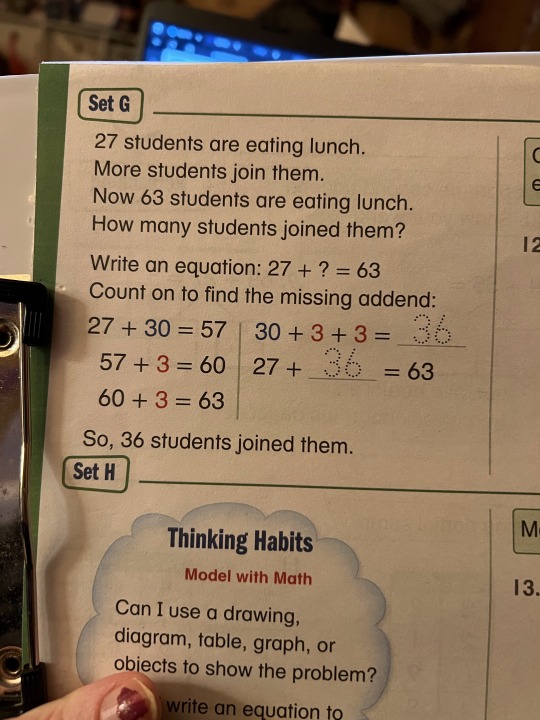
View On WordPress
#common core#common core math#crash landing#crashdlanding#education#elementary education#family#just say no to charter schools#kentucky#non-fiction#schools#standards#state run education#what
0 notes
Text
Common Core and the “conservative” flip-flop. You can lie about anything if you try hard enough.
#common core#conservative roots#lies more lies and statistics#bored middle class idiots#department of ignorance
0 notes
Text
i need to get this out of my head before i continue clone^2 but danny being the first batkid. Like, standard procedure stuff: his parents and sister die, danny ends up with Vlad Masters. He drags him along to stereotypical galas and stuff; Danny is not having a good time.
He ends up going to one of the Wayne Galas being hosted ever since elusive Bruce Wayne has returned to Gotham. Vlad is crowing about having this opportunity as he's been wanting to sink his claws into the company for a long while now. Danny is too busy grieving to care what he wants.
And like most Galas, once Vlad is done showing him off to the other socialites and the like, he disappears. Off to a dark corner, or to one of the many balconies; doesn't matter. There he runs into said star of the show, Bruce who is still young, has been Batman for at least a year at this point, but still getting used to all these damn people and socializing. He's stepped off to hide for a few minutes before stepping back into the shark tank.
And he runs into a kid with circles under his eyes and a dull gleam in them. Familiar, like looking into a mirror.
Danny tries to excuse himself, he hasn't stopped crying since his parents died and it's been months. He rubs his eyes and stands up, and stumbles over a half-hearted apology to Mister Wayne. Some of Vlad's etiquette lessons kicking in.
Bruce is awkward, but he softens. "That's alright, lad," he says, pulling up some of that Brucie Wayne confidence, "I was just coming out here to get some fresh air."
There's a little pressing; Bruce asks who he's here with, Danny says, voice quiet and grief-stricken, that he's with his godfather Vlad Masters. Bruce asks him if he knows where he is, and Danny tells him he does. Bruce offers to leave, Danny tells him to do whatever he wants.
It ends with Bruce staying, standing off to the side with Danny in silence. Neither of them say a word, and Danny eventually leaves first in that same silence.
Bruce looks into Vlad Masters after everything is over, his interest piqued. He finds news about him taking in Danny Fenton: he looks into Danny Fenton. He finds news articles about his parents' deaths, their occupations, everything he can get his hands on.
At the next gala, he sees Danny again. And he looks the same as ever: quiet like a ghost, just as pale, and full of grief. Bruce sits in silence with him again for nearly ten minutes before he strikes a conversation.
"Do you like to do anything?"
Nothing. Just silence.
Bruce isn't quite sure what to do: comfort is not his forte, and Danny doesn't know him. He's smart enough to know that. So he starts talking about other things; anything he can think of that Brucie Wayne might say, that also wasn't inappropriate for a kid to hear.
Danny says nothing the entire time, and is again the first to leave.
Bruce watches from a distance as he intercts with Vlad Masters; how Vlad Masters interacts with him. He doesn't like what he sees: Vlad Masters keeps a hand on Danny's shoulder like one would hold onto the collar of a dog. He parades him around like a trophy he won.
And there are moments, when someone gets too close or when someone tries to shake Danny's hand, of deep possessiveness that flints over Vlad Masters' eyes. Like a dragon guarding a horde.
He plays the act of doting godfather well: but Bruce knows a liar when he sees one. Like recognizes like.
Danny is dull-eyed and blank faced the entire time; he looks miserable.
So Bruce tries to host more parties; if only so that he can talk to Danny alone. Vlad seems all too happy to attend, toting Danny along like a ribbon, and on the dot every hour, Danny slips away to somewhere to hide. Bruce appears twenty minutes later.
"I was looking into your godfather's company," he says one night, trying to think of more things to say. Some nights all they do is sit in silence. "Some of my shareholders were thinking of partnering up--"
"Don't."
He stops. Danny hardly says a word to him, he doesn't even look at him -- he's sitting on the ground, his head in his knees. Like he's trying to hide from the world. But he's looking, blue eyes piercing up at Bruce.
Bruce tilts his head, practiced puppy-like. "Pardon?"
"Don't." Danny says, strongly. "Don't make any deals with Vlad."
It's the most words Danny's spoken to him, and there's a look in his eyes like a candle finding its spark. Something hard. Bruce presses further, "And why is that?"
The spark flutters, and flushes out. Danny blinks like he's coming out of a trance, and slumps back into himself. "Just don't."
Bruce stares at him, thoughtful, before looking away. "Alright. I won't."
And they fall back into silence.
Danny, when he leaves, turns to look at Bruce, "I mean it." He says; soft like he's telling a secret, "Don't make any deals with him. Don't be alone with him. Don't work with him."
He's scampered away before Bruce can question him further.
(He never planned on working with Vlad Masters and his company; he's done his research. He's seen the misfortune. But nothing ever leads back to him. There's no evidence of anything. But Danny knows something.)
At their next meeting, Danny starts the conversation. It's new, and it's welcomed. He says, cutting through their five minute quiet, that he likes stars. And he doesn't like that he can't see them in Gotham.
Bruce hums in interest, and Danny continues talking. It's as if floodgates had been opened, and as Bruce takes a sip of his wine, it tastes like victory.
("Tucker told me once--")
("Tucker?")
("Oh-- uh, one of my best friends. He's a tech geek. We haven't talked in a while.")
(Danny shut down in his grief -- his friends are worried, but can't reach him. When he goes back to the manor with Vlad, he fishes out his phone and sends them a message.)
(They are ecstatic to hear from him.)
It all culminates until one day, when Danny is leaving to go back inside, that Bruce speaks up. "You know," He says, leaning against the railing. "The manor has many rooms; plenty of space for a guest."
The implication there, hidden between the lines. And Danny is smart, he looks at Bruce with a sharp glean in his eyes, and he nods. "Good to know."
The next time they see each other, Danny has something in his hands. "Can you hold onto something for me?" He asks.
When Bruce agrees, Danny places a pearl into his palm. or, at least, it's something that looks like a pearl. Because it's cold to the touch; sinking into Bruce's white silk gloves with ease and shimmering like an opal. It moves a little as it settles into his hand, and the moves like its full of liquid.
Bruce has never seen anything like it before, but he does know this; it's not human. "What is it?" He asks, and Danny looks uncomfortable.
"I can't tell you that." He says, shifting on his foot like he's scared of someone seeing it. "But please be careful with it. Treat it like it's extremely fragile."
When Bruce gets home, he puts it in an empty ring box and hides the box in the cave. He tries researching into what it is. he can't find anything concrete.
Everything comes to a head one day when Danny appears at the manor's doorstep one evening, soaking wet in the rain, and bleeding from the side.
#dpxdc#dp x dc#danny fenton is not the ghost king#dpxdc crossover#dpdc#dp x dc crossover#dpxdc prompt#man i just really need more dpdc stuff where danny and bruce have a good relationship. like man i NEED it. like i need to see these two#bonding together. and not in a cracky 'oh danny is a distant friend/cousin/etc' stuff but like. active participants in each other's lives#or as active as can be in this case. i neeeeed these two getting along and caring about one another#this idea came to me like last night and hasn't left since nd it was driving me up the wall to think about both positively and negatively b#i neeeded someone to hear about this or i was gonna implode#danny is the first son#tried to just get the general gist of the idea down but i definitely thought of the idea that bruce lowkey suspects vlad for having a hand#Vlad allows Danny to sneak off because he thinks Danny is alone. if he knew Bruce was there he'd be piiisssed and would put a stop to it#Sam and Tucker are alive they just got ghosted for a bit by danny bc he was in Major Grief and didn't wanna socialize. He couldn't go to#them because he didn't wanna put them in danger via Vlad.#oh that thing he handed Bruce? Yeah that's his ghost core. I have a headcanon (that isnt always applied) that ghosts can take their cores#out of their bodies at will and painlessly and without issue. and its common practice actually to do so bc they can be a not insignificant#distance away from said core before problems start to act up. and its common for ghosts to leave their physical cores at their lairs for#safekeeping because as long as the physical core is fine: so is the ghost. they can reform if their body gets destroyed. it also acts as a#fast travel sometimes. where they can reform at their core in an instant. its not inspired in the slightest by SU but i do see the overlap#most cores are pretty small for safety sake: its harder to hit if its small. and they're pr resilient too but its better to be safe than#sorry. so yeah. danny essentially gave bruce the physical embodiment of his soul and indirectly said#'if anything happens to me at least i'll be safe with you'#danny doesn't know he's batman btw#starry rambles.#was gonna go into danny becoming a vigilante beside bruce but im sleeeepy so i'll do that in a reblog. he's gonna go by nightingale if#anyone is interested. stereotypical but to be frank it is a *good* name imo. has a good amount of syllables and consonants to it#and the bird theme. and since its part of an ancestral name it has even more backing for it being bird-y without being meta
303 notes
·
View notes
Note
i wanna know more about svsss menopause
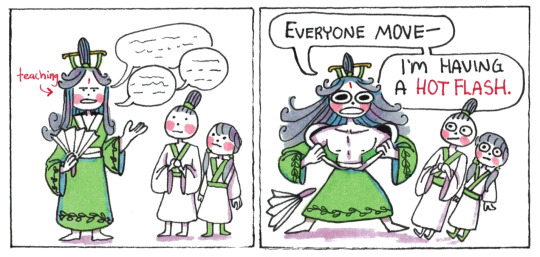
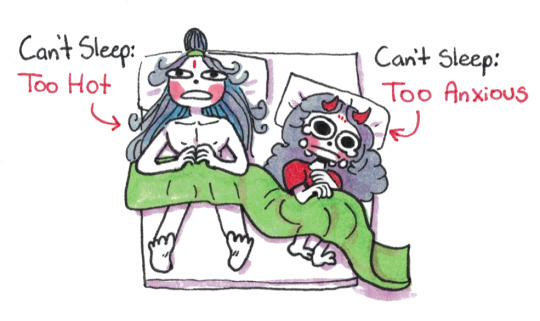

They synced their periods together too well. Now they are synced through their perimenopause years.
#Poorly drawn svsss#svsss#shen qingqiu#luo binghe#shang qinghua#mobei jun#ask#I truly think that the peak of the SVSSS (peri)menopause era is just them commiserating over the experience of it.#Not pictured here is Liu Qingge barely suppressing his hormonal rage. He would have it *bad*.#I think Liu Mingyan is the only person who does not have a bad time with menopause because she takes estrogen supplements.#Which sounds like a trans headcanon but I think regardless of cis/trans status she's researched this and is prepared.#I have developed a sense for what menopause is purely by exposure to the various complaints I have overheard/been told.#These are all very specific and yet very common stories.#I do not know what the overlap is for SVSSS fans and people (not just women) going through menopause. I hope this is funny to SOMEONE.#It's an untapped market of potential! Too many young'uns in these woods.#Synced periods this. Ovulating that. Where's the menopausal homicidal rage?#Come on! Ripping off your clothing in a sudden burst of heat is *SO* SVSSS core!!! Make perimenopause sexy!!!#Anyways. Please put your menopause headcanons in the comments/tags <3 I'd love to hear them.#Thank you joblessmonday for following up with an ask and giving me an excuse to release this train of thought.
781 notes
·
View notes
